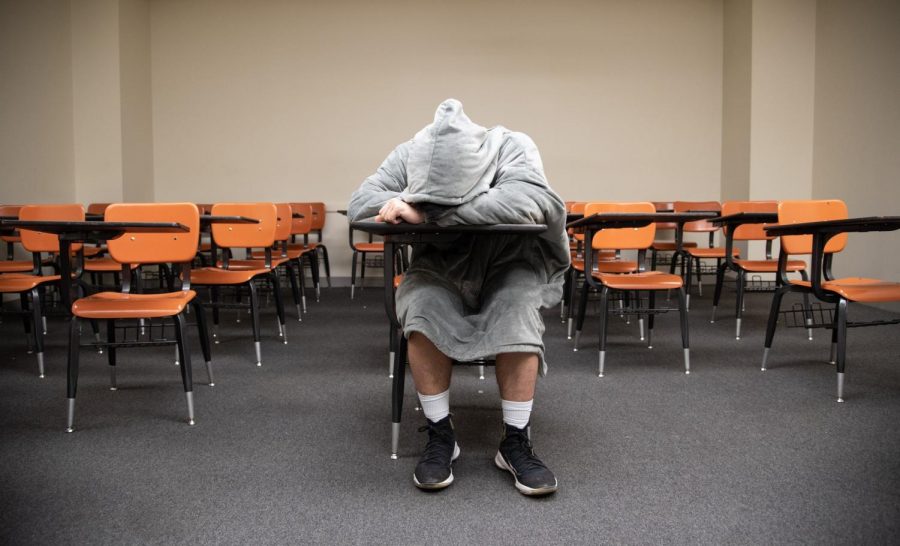Opinion: College students must prioritize sleep
February 16, 2020
There is inconvertible proof that loss of sleep has a negative impact on students’ grades as well as increase the level of anxiety both in and out of the classroom. It wasn’t but a few decades ago that students regularly kept “all-nighters” for cramming for an exam. There’s no better way to put your GPA in the tank than staying up all night or being sleep-deprived, which is a chronic problem on America’s campuses.
Chronic sleep deprivation is just as problematic as short bursts of lack of sleep. There is evidence that after two weeks of sleeping six hours or less a night, students feel as bad and perform as poorly as someone who has gone without sleep for 48 hours. New research also highlights the importance of sleep in learning and memory. Students getting adequate amounts of sleep performed better on memory and motor tasks than did students deprived of sleep. There is ample evidence to indicate that the lack of adequate sleep can lead to disturbances in brain function, which in turn, can lead to poor academic performance.
You can’t fool the sleep fairy or your internal clock! Students who stay up late during the week and attempt to make up for it by sleeping late on weekends are more likely to perform poorly in the classroom. This is because, on weekends, they are waking up at a time that is later than their internal body clock expects. The fact that their clock must get used to a new routine may affect their ability to wake up early for school at the beginning of the week when they revert back to their new routine.
Students should go to bed early enough to have the opportunity for a full night of sleep, which ideally is seven to eight hours a night. Remember your bed is for sleeping and not for studying, reading, TV or iPhone conversations. If you have trouble falling asleep:
- Get out of bed and do something relaxing until you feel sleepy.
- Take an afternoon nap (30-45 minutes if you keep it short).
- Try retiring and waking up at the same time even on the weekend as well as during the week. (Now I know this is a difficult suggestion for fellow Loyola students to follow!)
- Go slow on the “joe.” Avoid caffeine in the afternoon and at night. It stays in your system for several hours and can make it hard for you to fall asleep.
- Screen off! Get away from the computer; turn off the TV and the cell phone at least an hour before retiring.
- Exercise regularly but not one to two hours before going to bed.
- Drinking warm milk before bedtime has been considered a remedy for sleeping problems. Sleep experts believed that the tryptophan in milk was the sleep inducer. Studies have confirmed that tryptophan (which is a reason why so many of us drop like flies after a heavy meal of tryptophan-rich turkey on Thanksgiving Day) is not the likely explanation for sleep induction following a glass of warm milk. It is more likely that the routine of drinking a glass of warm milk is like the old teddy bear or blanket that reminds you of your childhood when one of your parents tucked you into bed at night. The psychological association with milk and the security of having your parents giving you a goodnight kiss is stronger than the medicinal effect of tryptophan as you would need to consume huge volumes of milk to receive the quantity of tryptophan to bring on the zzzzzz’s.
- Melatonin is a naturally occurring hormone produced by the brain that is often taken in pill form. Melatonin is available as an over-the-counter supplement to aid sleep. Melatonin is quite safe and is not habit forming, and you will not become “addicted” or dependent upon it. Therefore, if you find it to be helpful in improving your sleep, you may use it on a nightly basis without fear of adverse consequences. The melatonin dose may range from 1 mg up to 10 mg. I suggest starting with 1 mg for several days and slowly increasing the dose to a maximum of 10 mg if the lower starting dose is ineffective.
Bottom line: There are major types of sleep disorders that are beyond the scope of this article which include: obstructive sleep apnea and restless legs syndrome, but these disorders are less prevalent in college-aged students. Try a few of these suggestions, and you will have better grades and more sleep.







